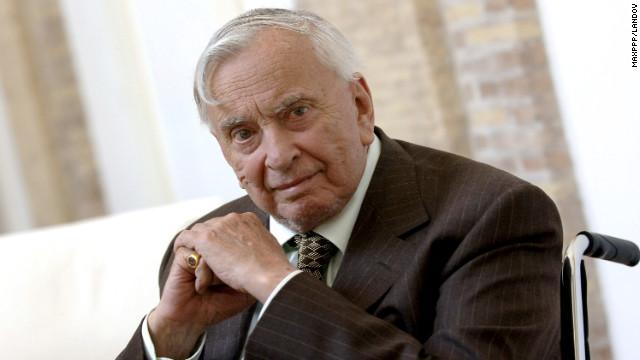Gore Vidal: American Renaissance Man . . . and a Very Funny Guy
By • August 29, 2012 0 694

I want to say thank you to Gore Vidal on the occasion of his death.
I haven’t laughed so hard and for so long in a long time.
I don’t mean to suggest that Vidal’s death is a cause for laughter—far from it. His death, in fact, is a great loss to civilization, certainly the kind that Vidal himself celebrated, a literary, well-read, cultured, multi-, if not, metro-sexual, well-educated and curious society which made a fetish as well as a virtue of being tolerant of what others might call vice. He was a Renaissance man, a literati, a writer, novelist and artist, a wit and wag, irascible and often venomous. He was a man who would have been entirely comfortable among the Classical Greeks, the Epicureans and Stoics, the Romans, the Borgias, the Augustans of both 18th-century England and Ancient Rome.
Ultimately, he was a through-and-through American of a particular, individualistic kind, a one-of-a-kind. Ironically or not, he spend his boyhood here in Washington, D.C., where his grandfather was a U.S. senator, and he attended St. Albans School. (Years ago, Vidal purchased a grave site with a tombstone engraved with his name and year of birth in Rock Creek Cemetery.)
He was, lest we forget, a very funny guy.
You could do worse as a stand-up comic than to just pout and shout out some of Vidal’s more punchy quips, which showed his hostility for politicians—shared by millions these days—democracy as it has come to be, ignorance, and the culture of celebration and celebrity. As in his own self-appraisal: “always a godfather, never a god.”
“A narcissist is someone who is better looking than you are,” or “The four most beautiful words in the English language are ‘I told you so.’ ”
But let’s be serious: Vidal, an avowed bisexual talked and wrote about the subject of sex frequently (“Myra Breckenridge” comes to mind as a novel and to the mindless as a movie). But his legacy, besides his enormous ego and wit, will be his historical novels, which pretty much everyone: gay, straight, elitist or general public, read and pretty much liked. I know I did and learned a lot and marveled how his erudition and encyclopedic knowledge managed to be stuffed into novels that were readable and moved at the speed of gazelles.
He wrote two historical novels about the ancient world: “Julian,” about the Roman emperor called the Apostate, who made an ill-fated (and much admired by Vidal) effort to roll back the tide of Christianity in the Roman Empire and “Creation,”, a book with an all-star cast of emperors, warriors and philosophers in the struggle between the Greek/Macedonian world and the Persian world and their world views. In this book, the effete, artistic, polytheistic Persians are the good guys in their war against the not-much-for-bathing, war-like Greeks.
But his major achievement—besides the huge collection of his essays, “United States,” which won a National Book Award in 1993—were his series of novels about American history and politics, notably the first salvo called “Burr” about the wildly adventuresome, brilliant and erratic Aaron Burr, who managed to mortally wound Alexander Hamilton in a duel and be the focus of a treasonous plot. In Vidal’s novel, Burr is also the father of President Martin Van Buren. The books—they included “1876,” “Empire,” “Hollywood” and “Lincoln” as well as two novels set in more contemporary Washington—were dense, revisionistic (some of the founding fathers are found to be wanting, including Jefferson and Washington), eye-popping and probing. Only Lincoln manages to escape Vidal’s caustic bouts of insight. The 16th president remains, as he has to historians, enigmatic and deeply human.
In addition, you could catch the venal, power-hungry grift and drift of American politics in “The Best Man,” the 1960 play by Vidal, revived on Broadway through Sept. 9.
Actually, Vidal’s major achievement may have been himself. As much as he abhorred the idea of the writer as celebrity, that’s what he became, a public figure, thus making himself vulnerable to hot debates, attacks, scurrilous comments of the kind he used himself, minus the wit. He wrote screenplays that certainly ran the gamut —“Ben Hur” but also “Caligula,” a triple-X film about Ancient Rome, starring the likes of Peter O’Toole, John Gielgud and Malcolm McDowell, that included Penthouse Pets doing what Penthouse Pets do if let loose at a Roman orgy.
Vidal was uncommonly blunt and honest about the foibles of others but also his own. And he—like Ronald Reagan—thrived on television, and he ran for office several times (U.S. Senate and House). Such ambition he shared with his friend and nemesis, the garrulous, hyper-Hemingway male totem Norman Mailer. Mailer was often quarrelsome, always brilliant and full of b-s and wrote as much as Vidal. They got in a fight on television once and at a party, and Mailer—whose only other victorious brawl occurred against an ex-wife—knocked Vidal down but not for the count. Vidal quickly rebounded: “As always, words fail Norman Mailer.”
Words never failed Vidal even near the end.
Talk show host Charlie Rose asked Vidal on his program, when Vidal, resembling a model of an ancient—in both senses of the word—Roman senator, what the first words of his obituary might be.
Vidal furrowed his amazingly vibrant brows, thought a minute and looking straight at the camera said: “It came to pass ….”
Well . . . It came to pass that Gore Vidal passed out of this worldly life July 31 at age 86, into some unknown place, which if it exists, might surprise him but also please him. He should remember that those of us who have read his books will miss him, knowing there will be no more of them and no more of him on this earth.

